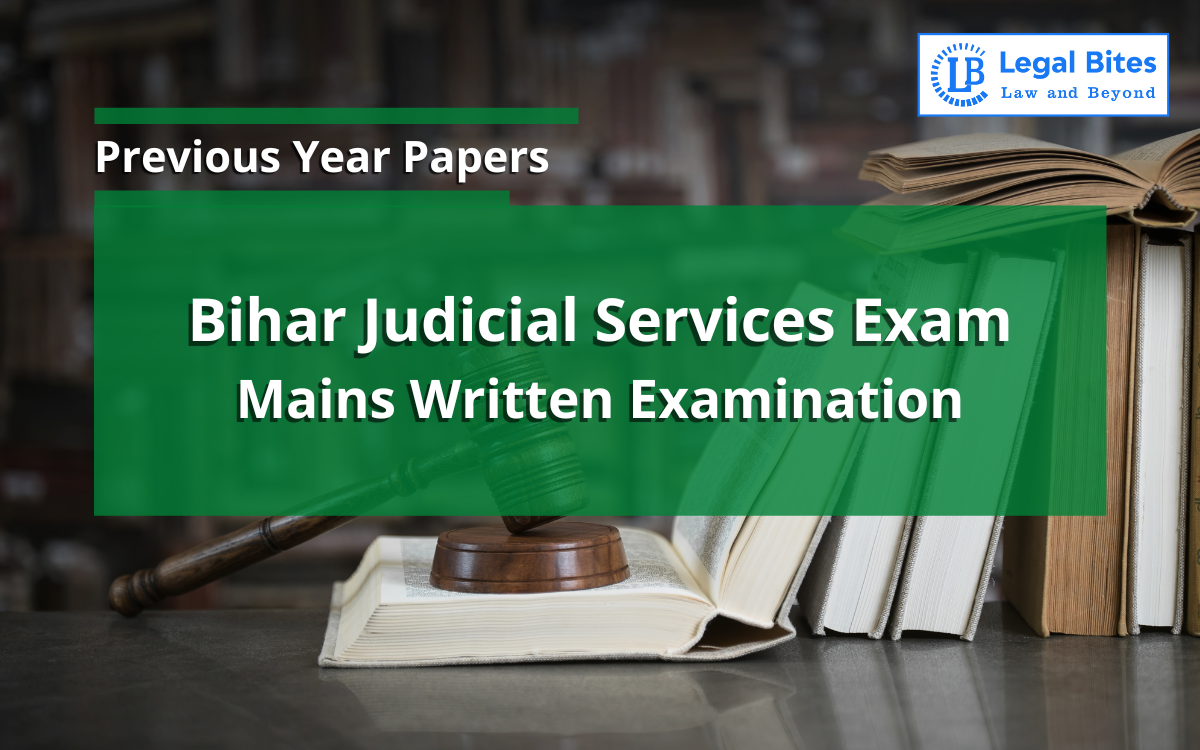Bihar Judicial Services Exam Mains 2023 Previous Year Paper (Constitutional and Administrative Law of India)
Candidates preparing for Bihar Judicial Services Exam should solve the Bihar Judicial Services Exam Mains 2023 (Constitutional and Administrative Law of India) and other previous year question papers before they face Prelims and Mains.

Candidates preparing for Bihar Judicial Services Exam should solve the Bihar Judicial Services Exam Mains 2023 (Constitutional and Administrative Law of India) and other previous year question papers before they face Prelims and Mains.
It also gives an idea about the syllabus and how to prepare the subjects by keeping the previous year's questions in mind. All toppers are mindful and cognizant of the types of questions asked by the BJS, to be aware of the various tricks and types of questions. This should be done by every aspirant when starting their preparation. It is very important to have an overall understanding of the pattern and design of questions.
Bihar Judicial Services Exam Mains 2023 Previous Year Paper (Constitutional and Administrative Law of India)
Only practising the authentic question papers will give you a real feel of the pattern and style of the questions. Here's Bihar Judicial Services Exam Mains 2023 Previous Year Paper (Constitutional and Administrative Law of India).
Bihar Judicial Services Mains Written Examination 2023
Constitutional and Administrative Law of India
Paper: Constitutional and Administrative Law of India
Time: 3 Hours
Maximum Marks: 150
Note: Marks are indicated against each question
Answer six questions, selecting three from each group.
Group - A
Question 1
The Supreme Court of India in Kesavananda Bharati case affirmed that "the power of the Parliament to amend the Constitution is very wide but not unlimited". Critically analyse this statement with the help of decided cases. (25 Marks)
Question 2
(a) "The Directive Principles of State Policy which have been declared to be `fundamental' in the governance of the country cannot be isolated from Fundamental Rights." Analyse critically. (12½ Marks)
(b) Has judiciary been a hindrance or facilitator in the interpretation of the Directive Principles of State Policy? Examine in the light of various judgements of the Supreme Court. (12½ Marks)
Question 3
Write short notes on the following: (12½ *2= 25 Marks)
(a) 'Doctrine of pleasure' along with its exceptions
(b) Doctrine of eclipse
Question 4
(a) What is the true import of the phrase 'to be a witness' used in Article 20(3) of the Constitution of India? (12½ Marks)
(b) Whether a subpoena to access the Facebook page of the accused containing incriminating material would be hit by the right of accused against self-incrimination? (12½ Marks)
Question 5
"The Supreme Court of India has been consistent in expanding the horizon and scope of right to life and liberty, barring few exceptions." Analyse this statement in the light of the Supreme Court judgements. (25 Marks)
Group - B
Question 6
"Power in the hands of administrative authorities is in the nature of public trust, and therefore, must be exercised in the best interest of the people." In this context, discuss the doctrine of public accountability. (25 Marks)
Question 7
What are the grounds on which the vires of a subordinate legislation can be challenged? Explain with the help of leading judgements. (25 Marks)
Question 8
"The purpose of the office of Lokpal is not to adjudicate, but to provide regular machinery for investigating grievances against the administration in a discrete and informal manner." Critically examine this statement by providing proper justification of the office of the 'Lokpal' in India. (25 Marks)
Question 9
"The law has been rightly laid down by the Supreme Court in the 'Vidyawati case'. Unfortunately within very short time a clear departure was made in the 'Kasturilal case' and the efficacy of the law laid down in the 'Vidyawati case' was considerably watered down by the Supreme Court." Discuss. (25 Marks)
Question 10
Write short notes on the following: (12½ *2= 25 Marks)
(a) Public interest litigation
(b) Legitimate expectation

